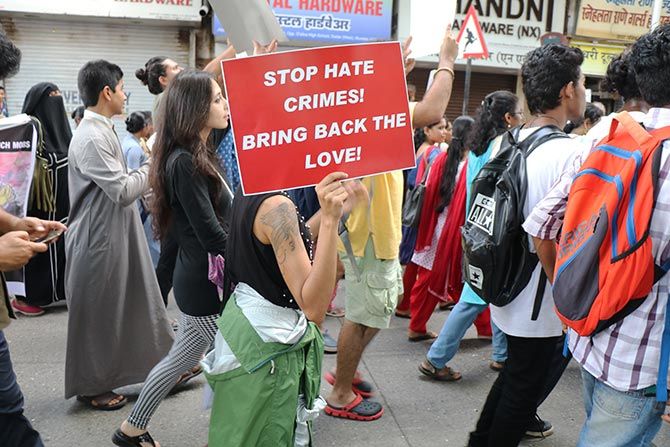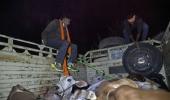'Fear is not created by those who are defending minorities and Dalits.'
'Fear is being created by the actions of political leaders like Yogi Adityanath and police forces.'
'The kind of hate statements that are being made to which there is silence from the prime minister's side.'

Citing a 'lack of response' from the National Human Rights Commission to a report submitted by him on the condition of persons 'deemed to be foreigners' in Assam's detention camps, social activist Harsh Mander has resigned as a special monitor of the rights panel.
Mander, a retired IAS officer, had started Karwan e Mohabbat (Caravan of Love) where he along with his volunteers used to visit the families of those killed in gau rakshak violence.
"Human rights is getting more and more eroded across the world with the kind of right-wing politics based on bigotry and anti-minority feeling which we are seeing," Mander tells Rediff.com's Syed Firdaus Ashraf.
Why did you resign as the NHRC's special monitor?
The NHRC created this new kind of office of special monitor who would not be on its staff.
I used to go there, investigate and advise the NHRC on critical issues.
When I was asked last year whether I would agree to be a special monitor at the NHRC for minorities and communal violence, I took up the job because it was very important in the times we are living in.
I agreed on the condition that I could work on NHRC's as well as my concerns.
After I joined, the NHRC never reached out (to me).
On my own I approached the NHRC on three issues: Police encounters in Uttar Pradesh, police encounters in Mewat (Haryana), and detention centres in Assam.
After much pressing, they agreed to send a mission to Assam's detention centres.
Early January, I went to the centre where people are deemed to be foreigners.
I was the first non-official to enter these centres as the place was completely closed.
When I went in I was absolutely appalled by the human tragedy and illegality which was happening there.
I did not speak publicly about it and sent a detail report on what the Constitution of India and international law say (about refugees), what questions we need to ask to the Assam government and the central government.
I repeatedly reminded them, but the NHRC refused to act.
What action did you want the NHRC to take?
International law is very clear.
Anyone who is deemed an illegal immigrant cannot be detained in a prison-like situation.
These people (in Assam) have been kept in a portion of a jail.
The world is anguished over the separation of illegal immigrants' children in the United States and here we are separating children from parents for almost a decade!
I saw a situation in which the father was in the male detention centre and the mother was in the female detention centre. The children were outside and had no idea about their parents' status.
Also, these people were not given a single day's parole.
How long had they been in jail?
It is going on for nine years.
They were kept inside and became prisoners for life.
They were not even given the rights of prisoners, like parole.
For these refugees, life is worse than prisoners as they do not get parole too.
There was no prospect of this situation ever ending.
I felt the NHRC has not raised this issue and I kept reminding them.
Now the National Register of Citizens list is going to be published on June 30 (in Assam) and I was extremely worried how many will be declared as illegal immigrants.
We cannot have the State dealing with them in this fashion where we create concentration camps.
Therefore, I resigned.
Are you saying that the Government of India is running concentration camps?
No.
What I am saying is that you have no business in keeping them (refugees) in jails, which the Indian government is doing.
Al Jazeera had done a story that there might be half a million people declared as stateless, which the government has strongly denied.
But Prateek Hajela, who is the co-ordinator of the NRC, (Hajela is also secretary of home and political department, Assam) says there could be 50,000 people.
Now what are you going to do with these 50,000 people?
Jails are not large enough to accommodate them.
India has to have a policy which has to be in conformity with its Constitution and international law with humanitarian principles.
Don't you think illegal immigrants can create problems like terrorism?
This is exactly what (United States President) Donald Trump says.
We do not call them refugees but infiltrators, and here most of the people are economic refugees.
They are poor and unable to deal with the legal process.
Most of the people whom we met were waiting for ex-parte orders.
What is Bangladesh saying about these illegal immigrants? Are they ready to take them back?
Earlier, when they (refugees) would be declared foreigners, India would push them to the Bangladesh side and some of them would go and some of them would be pushed back.
Bangladesh now has clearly said that they are not going to accept these illegal immigrants and they have refused to accept them.
Why does nobody want to take in the immigrants, be it Trump or India?
That is why I feel I have a duty to speak about an unpopular issue and bring it up in the public discourse.
Do you think human rights have no meaning in India now?
Human rights is getting more and more eroded across the world with the kind of right wing politics based on bigotry and anti-minority feeling which we are seeing.
Did you get any response to your resignation letter from the NHRC?
No.
I sent a series of letters before I put in my final resignation.
You have mentioned encounter deaths as one of the reasons in your resignation letter, but is it not true that they happened in earlier regimes too?
We have to have our concerns.
What is worrying now and especially in Mewat area is that it seems to target a particular community and caste.
Encounter killings are a gross violation of human rights.
If you target one particular community in encounters, then it is very disturbing.
Prime Minister Narendra D Modi said there is a fear being created in the minds of Dalits and Muslims that the BJP is bad for them.
Fear is not created by those who are defending minorities and Dalits.
Fear is being created by the actions of political leaders like (Uttar Pradesh Chief Minister) Yogi Adityanath and police forces.
The kind of hate statements that are being made to which there is silence from the prime minister's side.
These things are creating fear, and not human rights people.
Is your Karwan e Mohabbat initiative still on?
Every single month I resolve to go to some place.
The day before yesterday I was in Hapur and met a deceased's family. (Kasim was lynched by a mob over alleged rumours that he had slaughtered a cow).
We also went to Tamil Nadu and coastal Karnatka where there have been attacks.
We reach out to families and say that we care and we want to reach every family that is affected by beef violence.
We will continue to do this till the State violence continues.
Why is the violence in the name of the cow not stopping in India?
Because it is legitimised by the ruling establishment and we have a system in place now where hate has become acceptable.
People who are perpetrators of such violence feel more empowered than they used to do in earlier times.
Do you think the hearts and minds of Indians have been deeply divided?
Yes, it is deeply divided.
In fact, I have just concluded a book, Partition of the Hearts -- and the making the idea of India, for Penguin.











 © 2025
© 2025